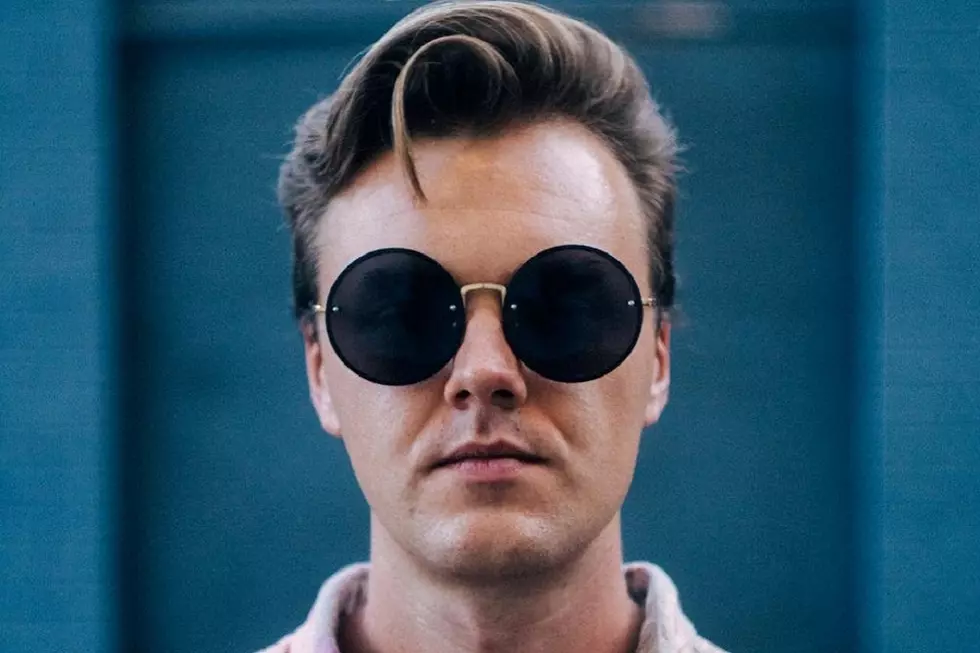
Interview: Parker Millsap Turns His Musician’s Lens on Himself on New Album, ‘Bere Here Instead’
Parker Millsap has been working on his music career since he was a teenager. As he nears the end of his 20s, though, he's started focusing a bit more on himself.
"I'm learning about anxiety and how it manifests in myself -- learning to recognize it, and then making the connection that, often, if I can come back into my body and just focus on a few breaths and pay attention ...," Millsap shares, explaining how he'll mentally list off the things he sees around him to help center himself.
"Little things like that are very practical ways for me to, like, deal with my bulls--t," he says.
The singer-songwriter's new album, Be Here Instead -- his fifth full-length record, out Friday (April 9) -- finds him channeling that coping mechanism musically: looking inward, rather than focusing on character-based lyrics. The title track, "Now, Here," is a musical meditation on being present, in fact; synth and piano lead Millsap to the upper ranges of his voice, creating a bit of an ethereal, '80s vibe.
"I wrote the song before I had read the Ram Dass book Be Here Now ... It's a nice thing to say to myself: Be wherever you're at, not in your mind, thinking about something that's two days from now that's not here," Millsap says, adding wryly, "So then I read Be Here Now and I was like, 'That's great. I agree, Ram Dass.'"
Millsap's sound, too, has blossomed -- a process that began a few years ago, while he was working on his last album, 2018's Other Arrangements. "I just became aware of a lot of different music, and how to use Spotify and YouTube to my advantage to find good new music -- like, just kind of realizing how much music is out there to listen to," he tells The Boot.
From R&B and soul artist and producer D'Angelo to glam-rock icon David Bowie, it was all on the table, and it all influenced Millsap has he created Be Here Instead. "I don't think the record sounds like any of those things, [but] to me, I hear little pieces of it," he reflects. Listen to "The Real Thing" and find a droning reminiscent of a sitar in some Indian music; jazz greats such as Ella Fitzgerald, meanwhile, inspired a deeper appreciation for "really solid melodies and really solid and interesting chord progressions."
"So, I think, with all these songs, I was trying to figure out how to do that: How do I really simplify," Millsap says, "make really strong melodies with really strong chords behind them that I don't have to -- that I can just kind of have the song and not have to worry about impressing anybody, including myself."
That mindset is certainly a hallmark of getting older. It was never something Millsap thought was a problem, though, he says, "until I was able to make it less of one."
"I mean, I made my first record -- I was, like, 14 or 15 ... and so every time, I feel like I get a little bit better at it and a little more mature, and understand my own skillset a little bit more. And on top of that, I'm changing, I'm having new experiences," continues Millsap, who got married, experienced some changes within his band and has, between his last album and now, gone through some "things that were just kind of tough and weird and adult."
"And I feel like the songs on this record, I really made them for me," he adds. "Not that I necessarily created for the fanbase or not for the fanbase in the past, but with this one, I think I realized how much I was thinking about that."
While writing Be Here Instead, Millsap also found that the songs came to him "almost backwards" from his usual way. "A lot of them came guitar riff first. And I would just play that every time I picked up a guitar for a few months, and then, eventually, a melody would pop into my head," he recounts. "And then it's like, 'Okay, now what kind of beat would go with that?' ...
"So now, instead of writing words and then fitting a melody to the words, I'm doing the opposite on a lot of these songs," Millsap says. "And in doing that and not having a specific, preconceived notion for what I wanted the song to be about, I kind of found that when you put yourself in that situation, your subconscious will sneak up on you, you know?"
Millsap wrote almost all of Be Here Instead prior to the start of the COVID-19 pandemic, though he admits that a year at home has been a good opportunity to slow down and let those subconscious thoughts creep in. Instead, he attributes some of that change in songwriting process to a new, pre-pandemic hobby: painting. Working in a different, more visual art form, Millsap says, "helped me break out of many stale writing periods" and embrace the unknown and the difficult.
"I don't know anything about painting -- like, I've never taken a lesson or anything like I have with music ... and I found that really freeing, just being able to splatter paint until it looks like, 'Oh, that looks kind of cool,'" he says. "And that made me feel more at home doing that with music ...
"It kind of helped me open that part of myself that had to do with songwriting," Millsap adds. "I was able to give myself permission -- like, 'You can do this with music, too.'"
See Country Music's Most Anticipated Albums of 2021:
More From TheBoot









